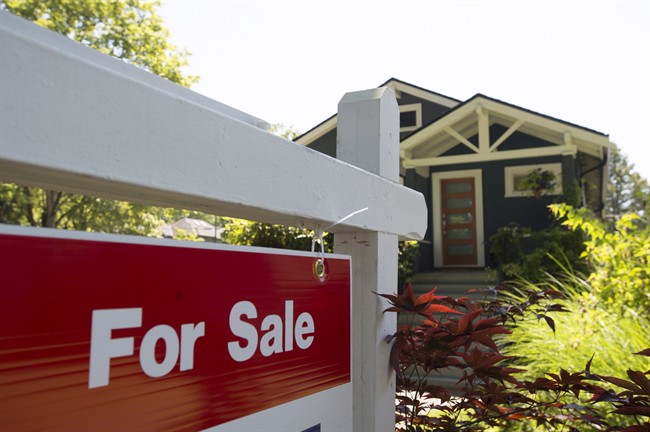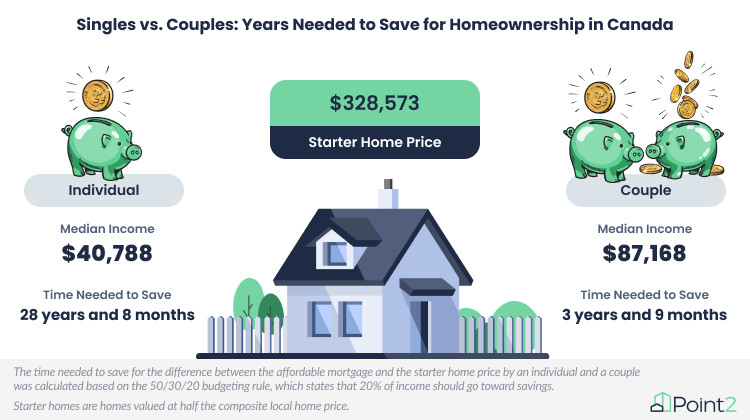Homebuyers on a single income are not out of the game when it comes to purchasing a starter home in Canada, unless trying to do it in Ontario where market conditions are making it increasingly unlikely, according to a study.

Data from real estate search portal Point2 says there is a 40-year gap in the savings timeline between Ontario singles and couples when it comes to securing a mortgage and additional funds to pull off a home purchase. An individual is often looking at 50 to 70 years of saving to get there, whereas couples typically need 12 and 26 years.
‘This means that buyers on an individual income — as well as home seekers starting from a double income — would need a formidable amount of time to save,” says Point2 senior real estate writer Andra Hopulele.
Characterizing the process as a “hurdle race,” the study says the first big hurdle for a buyer with a median income of $40,788 a year is an estimated 28-plus years of savings combined with an approved mortgage to purchase a starter around $328,500 in one of Canada’s 70 largest cities.
Meanwhile, a couple could do it with their buying power in just under four years.
The figures assume a person or couple is putting away 20 per cent of their earnings toward a home purchase.
Single and coupled home seekers across 10 of the province’s largest cities face decades-long saving timelines to cover the difference between the price of a starter home and what the bank would loan them.
The number gets larger as one approaches municipalities in the Greater Toronto and Hamilton Area (GTHA), particularly since benchmark home prices are beyond $1 million.
In Toronto, the research reveals a lone buyer on a median income of around $41,000 will have to amass some 47 years of savings to buy a starter in the $500,000 range.
“Even with a partner, couples in Toronto still need close to 12 years to save enough,” Hopulele said.
“These figures underscore the challenges faced by aspiring homebuyers, especially in high-demand areas, like Toronto, Oakville, and Richmond Hill, where the cost of starter homes can exceed $500,000 and even $700,000.
In Hamilton, a person finding a low-end dwelling around $400,000 would be looking at potentially 40 years of saving compared with a couple who might be able to do it in just eight years.
The Point2 research says Thunder Bay is the only one of the 10 that stands out with the savings gap between singles and couples under four years.
“Individuals looking to purchase a starter home in Greater Sudbury and Chatham-Kent can also benefit from relatively shorter savings timelines, compared to larger cities,” according to Hopuele.
Last fall, online realtor Zoocasa offered up its own indicator of the housing affordability crunch in Ontario by suggesting a Toronto household needed to be making an annual income of $212,000 to be able to afford a $1.16 million home in the city — which was the city’s average price in September.
In Hamilton, it was about $184,000 to manage debt on a $873,000 dwelling.
The agency also calculated that a household would have to come up with $250,808 to cover the down payment and closing costs on a $1.06 million home in the city — which was the average benchmark price in January.
In Hamilton, one needed $72,849 to close on an average home price of $809,600.
In terms of knowing when to get into the game as a first-time buyer, most realtors agree there isn’t an ideal time since markets across Canada tend to be cyclical in terms of affordability and price.
“Most likely the cost of owning that home will fall in the future … because the mortgage rates will decline,” said Marcus Plowright, co-owner of the A-Team brokerage in London, Ont.
“But if they wait with declining mortgage rates, what’s most likely to happen is we’ll see a slow climb in the value of average value of homes, and the affordability won’t improve.”
Are you currently in the market for your first home? Did you purchase your first-ever home within the last year?
If you have a story to tell about how challenging it is to purchase a home or to close the deal, we’d like to hear about it.





Comments